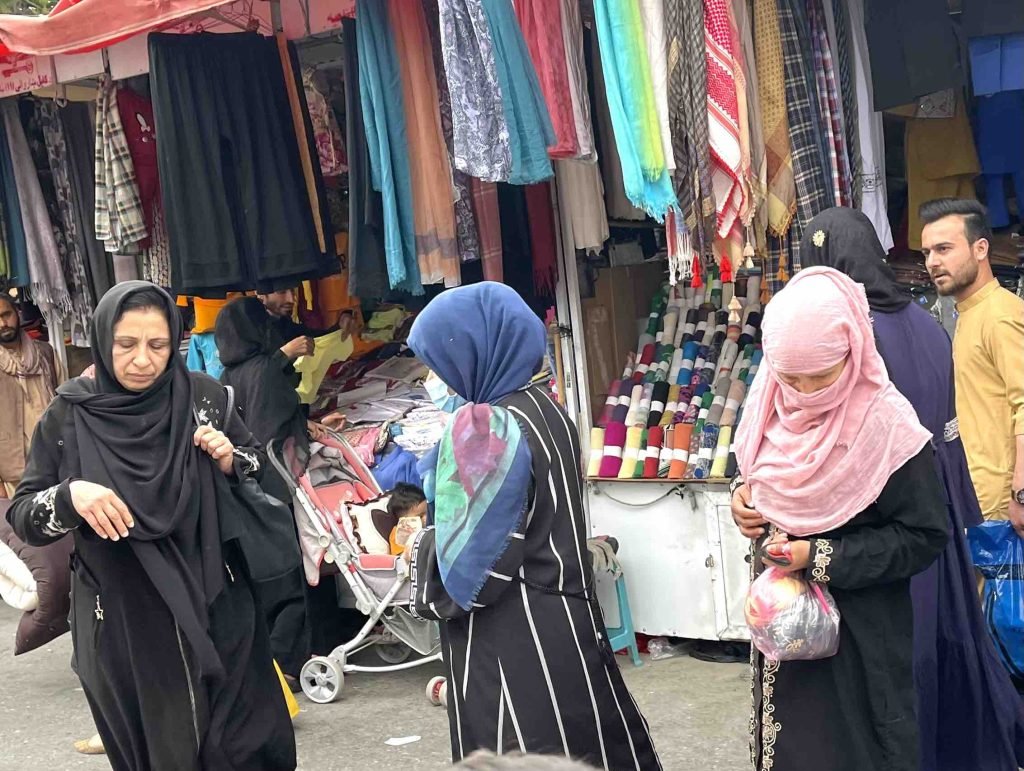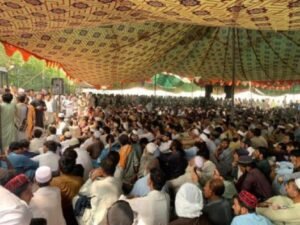Divergent Perspectives: Afghan Women’s Responses to the Taliban Threat and International Engagement

Afghan women in Kabul's market, March 2023. Photo: @AADIL
By Nazila Jamshidi
Since the Taliban’s takeover in August 2021, women in Afghanistan have experienced profound and devastating consequences. As the primary victims of the regime change, they continue to endure immense suffering under the new rule. The Taliban’s imposition of strict limitations on women extends far beyond the realm of education, permeating various aspects of their lives. In stark contrast to the progress made in recent years, where women had started to assume prominent roles in the workforce, the Taliban’s policies have effectively rendered them invisible and marginalized. Many women have been forced out of their jobs, and those who manage to retain employment face significant barriers and discrimination. The right to fair judicial service has been severely compromised for Afghan women. Under the Taliban’s rule, women’s access to justice has been curtailed, resulting in limited recourse in cases of abuse, violence, or other injustices. The lack of protection and support further exacerbates their vulnerability and perpetuates a culture of impunity. The Taliban’s oppressive policies suppress any form of dissent or independent gathering, leaving women voiceless and unable to advocate for their rights collectively. Denying their freedom of expression silences their concerns and perpetuates their marginalization.
It is crucial to note that all the stated Taliban’s restrictive measures do not discriminate against women based on ethnicity. Instead, they apply indiscriminately to all Afghan women, irrespective of their background. This broad application highlights the systematic nature of the Taliban’s oppression and underscores its pervasive impact on women’s lives throughout the country. In other words, the Taliban policies toward women are a common challenge and pain that women across the country and from every ethnic group experience and will continue to experience under the new rule.
Despite occasional statements from Taliban leaders, which hint at a more moderate approach towards women’s rights, their actions on the ground demonstrate very little flexibility.
While facing a grave threat to their hard-won gains in education, employment, and overall well-being, Afghan women lack a unified standpoint against the Taliban. While they recognize the uncompromising nature of the Taliban’s policies, their perspectives diverge on how the international community should engage with the de facto authorities. This lack of consensus impedes efforts to address the pressing issue of women’s rights in Afghanistan. Women observe that the implementation of the Taliban’s policies consistently reflects a deeply entrenched and uncompromising view against women’s rights. Yet, they are divided over how the world should deal with the Taliban. Some call for diplomatic and economic engagement with the de facto authorities. They argue that diplomatic engagement could lead to gradual improvements and open avenues for dialogue. Some others are against unconditional diplomatic engagement with a highly suppressive regime. They reason that such engagement could legitimize and encourage the Taliban, ultimately perpetuating the repression of women’s rights. Their concerns stem from the Taliban’s track record, which has shown little willingness to compromise or respect human rights.
This divergence of perspectives was evident during the 53rd session of the Human Rights Council in Geneva on June 19th, where Afghan women presented conflicting strategies for diplomatic relations with the Taliban. Whether or not diplomatic engagement is an effective tool for restoring women’s rights in Afghanistan, it is essential to recognize that ununified voices and conflicting strategies will not lead to any policy reform.
Building Bridges of Solidarity: Uniting Afghan Women Across Ethnic Lines to Defend Rights and Shape a New Reality
Afghan women need to find themselves compelled to confront a harsh and daunting reality. The reality is that the Taliban have control of Afghanistan, their policies on women are inflexible, and they continue to impose their will on Afghan women. The other reality is that the international community, despite condemnation, is unwilling to resist the Taliban through military means. So far, localized resistance efforts within Afghanistan have failed to gain traction on a national scale. In the face of these challenges, Afghan women have bravely taken part in nonviolent protests, but without the widespread support from their fellow women and Afghan men, these courageous acts are unlikely to bring about significant change to their circumstances. These new realities, which undoubtedly undermine women’s rights, must serve as unifying factors, bringing women from all ethnic groups together. Regardless of their backgrounds, Afghan women are confronting a common threat that significantly impacts the present and future generations. Women must transcend their ethnic differences and forge connections based on their shared experiences and challenges.
By fostering solidarity among women, they can cultivate a collective voice and leverage their strength in numbers to advocate for their rights effectively. This unity has the potential to amplify their impact and increase the likelihood of generating tangible change. Afghan women must recognize that the threat they face extends beyond their individual experiences and encompasses women’s well-being and future prospects throughout the country. United voices will enable them to establish support networks, exchange knowledge and strategies, and create collaborative initiatives that can defy the pressures imposed by the Taliban.
Such unity can also attract Afghan men’s support in this critical struggle. Women need to concentrate on a collective effort essential to policy reform and advocate for creating an inclusive environment that upholds the rights and dignity of all Afghan citizens. While the path ahead may be difficult, Afghan women must remain resolute in pursuing justice and equality. By harnessing their collective strength and forging alliances across ethnic lines, they can develop a new reality, one that is committed to realizing women’s rights and securing a future for generations to come.
Nazila Jamshidi – a gender equality and human rights specialist involved in Afghanistan’s development and democracy processes for the past decade – has worked for the UN, USAID, the International Federation of Red Cross.
Note: The contents of the article are of sole responsibility of the author. Afghan Diaspora Network will not be responsible for any inaccurate or incorrect statement in the articles.








